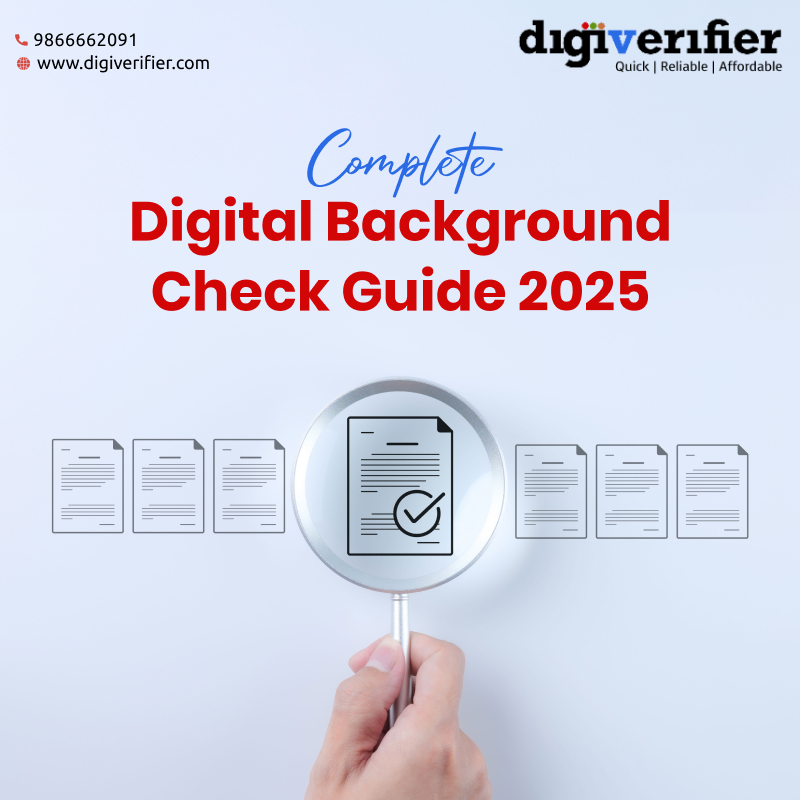The Complete Guide to Background Verification for Remote Workers in 2025
 August 6th, 2025
August 6th, 2025
Remote work exploded after 2020. And companies quickly adapted to zoom meetings, global teams, and flexible hours became a routine. Today, every company is hiring across borders with ease. And this shift demands smarter vetting.
Without in‑person meetups, trust must be built online. A solid vetting system ensures hires are who they say. Digital BGV makes this both fast and reliable.
In 2025, background methods are smarter. AI flags deepfake interviews and scams. Blockchain keeps credentials tamper-proof. Background checks happen in real time—every step is faster and harder to fool.

Digital BGV: The New Standard for Remote Hiring
Digital BGV is now baseline. Not your average luxury but is essential in today’s remote hiring world.
-
Traditional vs. digital background check methods
Old methods relied on paper, calls, and slow loops. Digital background check uses automated workflows, secure uploads, and instant flagging. It’s faster and safer.
-
Why digital BGV is crucial for remote workers
Remote workers never come to your office. You can’t meet them face‑to‑face. And hence, you need accurate identity checks and fraud prevention. Digital BGV ensures you hire with confidence.
-
Speed and efficiency advantages
Digital BGV cuts turnaround from days or weeks to hours. AI and automation scan documents fast. Employers get results quickly.
-
Real‑time verification capabilities
Checks can run continuously. If a criminal record or license issue arises after hire, alerts can fire instantly. This protects your team in the long term.
-
Digital document fraud prevention
Deepfakes and screen scams are rising. Scammers pose as real people. Digital BGV uses biometrics, video verification, and blockchain to ensure authenticity.
Explore the Digiverifer advantage.
Essential Digital Background Check Components for Remote Workers
A complete check covers identity, qualifications, history, behavior and finance.
-
Digital identity verification (government‑issued IDs)
Workers upload a passport or license. Automated tools match face to document. They detect tampering or fraud.
-
Online employment history verification
Digital BGV lets you verify past employers fast. It flags inconsistencies right away.
-
Digital education credential checks
Degrees and certifications get instant confirmation through secure records or blockchain sources.
-
Digital criminal background screening
AI-powered checks scan global databases in real time, ensuring no surprises.
-
Virtual reference verification
Instead of slow emails, digital systems ping supervisors or colleagues quickly and reliably.
-
Social media screening through digital BGV
Algorithms scan public profiles for red flags. They review tone, sentiment and patterns—not harmless old jokes.
-
Credit checks via digital platforms
When roles require financial responsibility, digital credit checks give fast insight. They only run with consent and where legal.
International Remote Worker Verification
Hiring worldwide is now easy. But it brings legal, cultural, and documentation challenges.
-
Cross‑border legal compliance
Each country has its own privacy rules. A digital background check must adjust to GDPR in Europe or local laws elsewhere.
-
International criminal record checks
A global digital BGV taps official sources around the world. It adjusts to data access limits in some countries.
-
Work authorization verification
Digital platforms confirm work permits and visas. They check expiration dates to ensure compliance.
-
Tax compliance documentation
Remote hires need tax forms like W‑8 or W‑9 in the U.S. Digital tools collect and store these securely.
-
Cultural and regulatory considerations by region
In some countries, credit or social media checks may be off‑limits. Digital BGV adapts to regional rules and sensitivities.
Understand the repercussion of a failed background check verification.
Legal and Compliance Considerations
Background checks carry legal weight. You must follow strict rules everywhere you hire.
-
GDPR and data privacy laws
If any remote worker lives in the EU, GDPR applies. This refers to data protection, secure storage, and deletion rights.
-
Regional employment regulations
Ban‑the‑box laws delay criminal history questions. AI screening requires bias audits. All must be handled automatically by digital tools.
-
Right to work verification
In the U.S., IRP and E‑Verify updates in 2025 require digital compliance workflows. Similar updates are happening globally.
-
Anti‑discrimination compliance
Digital systems should only flag job‑relevant issues. AI tools need checks to avoid bias.
-
Record retention requirements
Some laws require keeping data for years. Others mandate deletion after checks. Digital BGV platforms automate this clean‑up.
Best Practices for Digital BGV Implementation
Even the best tools fail without clear process. Here’s how to do it right.
-
Standardized digital background check workflows
Set a clear, automated process for every hire. Define deliverables and approval steps.
-
Clear communication protocols for digital BGV
Tell candidates what you check and why. Send reminders. Keep consent and updates transparent.
-
Timeline management for digital verification
Track every step involved – when the document was uploaded, when was the check started, and finally when was the report completed. Use dashboards and alerts.
-
Digital documentation requirements
Define exactly which documents you need. Give easy upload options and quality guidance.
-
Candidate experience optimization in digital BGV
Fast checks and clear status updates create trust. A good experience improves employer brand.
In 2025, digital background check is the backbone of safe remote hiring. Digital BGV systems are fast, reliable, compliant, and fraud-resistant. Choose a digital BGV provider for a safer, faster and more precise background check.
If you are looking for seamless, secure digital background verification for remote hires, DigiVerifier is ready at your doorstep. We offer fast digital BGV workflows and cover identity, criminal, education, employment, social media screening, and follow international compliance as well.
